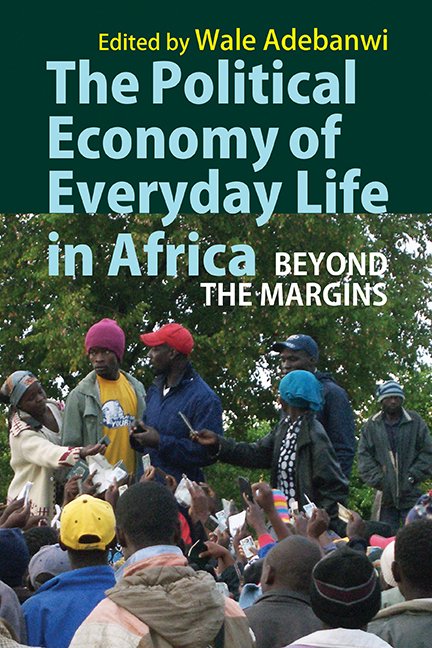Book contents
- Frontmatter
- Dedication
- Contents
- Maps, Illustrations & Tables
- Notes on Contributors
- Foreword
- Acknowledgements
- Approaching the Political Economy of Everyday Life An Introduction
- Part I MONEY MATTERS: CURRENCY & FISCAL LIFE STRUGGLES
- Part II LABOUR, SOCIAL LIVES & PRECARITY
- 5 From Enslavement to Precarity? The Labour Question in African History
- 6 Navigating Formality in a Migrant Labour Force
- Part III MARGINALITY, DISAFFECTION & BIO-ECONOMIC DISTRESS
- Part IV HISTORICITY, TEMPORALITY, AGENCY & DEMOCRATIC LIFE
- Afterword: The Landscapes Beyond the Margins Agency, Optimization & the Power of the Empirical
- Index
5 - From Enslavement to Precarity? The Labour Question in African History
from Part II - LABOUR, SOCIAL LIVES & PRECARITY
Published online by Cambridge University Press: 31 August 2018
- Frontmatter
- Dedication
- Contents
- Maps, Illustrations & Tables
- Notes on Contributors
- Foreword
- Acknowledgements
- Approaching the Political Economy of Everyday Life An Introduction
- Part I MONEY MATTERS: CURRENCY & FISCAL LIFE STRUGGLES
- Part II LABOUR, SOCIAL LIVES & PRECARITY
- 5 From Enslavement to Precarity? The Labour Question in African History
- 6 Navigating Formality in a Migrant Labour Force
- Part III MARGINALITY, DISAFFECTION & BIO-ECONOMIC DISTRESS
- Part IV HISTORICITY, TEMPORALITY, AGENCY & DEMOCRATIC LIFE
- Afterword: The Landscapes Beyond the Margins Agency, Optimization & the Power of the Empirical
- Index
Summary
It is a particular pleasure to contribute to this engagement with Jane Guyer's work. Jane and I have known each other since the beginning of both our careers. We were junior faculty members at Harvard, Jane in Anthropology, me in History, during the late 1970s and we were both part of a lively community of Africanists in the Boston area. Since Harvard had a tradition of faculty not talking to each other – and African studies there was particularly moribund at the time – we usually got together at Boston University's African Studies Center, for a time located in a rambling old house on the Brookline–Boston border. In the 1980s, there was a diaspora of Africanists from Boston-area universities – including the migration of Jane and Sara Berry to Johns Hopkins and me to Michigan – a process that makes this period of exchange and mutual influence particularly poignant in, at least, my memory.
There is more than nostalgia to the interest that this period holds. It was formative in terms of the theoretical incisiveness that characterized the study of Africa, and Jane was very much part of the movement both to raise questions and to innovate in the conceptual apparatus, within and beyond her discipline. Anthropology had a long track record in the study of Africa, and that meant it had a closet-full of concepts that had to be sorted through, perhaps to be discarded, perhaps to be reinvigorated. History was starting from a more naïve, or perhaps less overburdened, position, for the mere claim that Africans had a history was enough of a founding principle for the field in the 1960s. What historians were to make of that fact was not so clear. A formative moment in the rethinking process came when the African Studies Committee of the Social Science Research Council (SSRC – a committee that was abolished some years later in a fit of anti-area-studies hubris) commissioned for the African Studies Association meeting of 1980 a series of presentations on important conceptual issues. It had the temerity to ask younger (i.e. untenured) scholars to present some of these studies, beginning a process that the SSRC pursued for some years. Jane presented a paper on ‘Household and Community’ (Guyer 1981) and I did one on ‘Africa and the World Economy’ (Cooper 1981).
- Type
- Chapter
- Information
- The Political Economy of Everyday Life in AfricaBeyond the Margins, pp. 135 - 156Publisher: Boydell & BrewerPrint publication year: 2017
- 1
- Cited by



